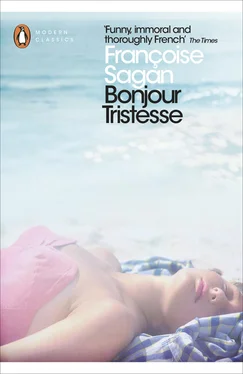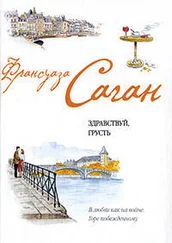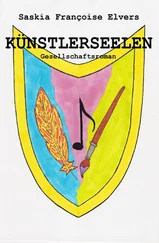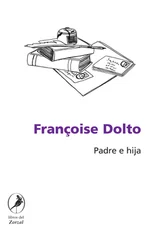Then one day at a friend’s house I met a cousin of the friend’s whom I liked and who liked me. I went out with him a lot in the course of just one week, as one does with a person, frequently and foolhardily, when a love affair is just beginning, and my father, who was not well suited to being on his own, did likewise with a rather ambitious young woman. Life took up again along its old lines, as it was bound to. Whenever my father and I are together, we laugh and talk about our conquests. He must suspect that my relationship with Philippe is not platonic and I know perfectly well that his new girlfriend is costing him a lot of money. But we are happy. Winter is nearly over; we shall not be renting the same villa again, but a different one, near Juan-les-Pins.
Only, when I am in bed, at dawn, when all that can be heard in Paris is the sound of cars, my memory sometimes betrays me: summer, with everything I remember of it, comes flooding back. Anne, Anne! I repeat that name very softly to myself, over and over in the dark. Then something stirs within me that, with eyes closed, I greet by its name, sadness: Bonjour tristesse.

To Florence Malraux 1
Love is what happens between two people who love each other.
Roger Vailland 2
PART ONE
One
We had been spending the afternoon in a café on Rue Saint-Jacques, 3an afternoon in springtime like any other. I was quietly rather bored: I was moving back and forth between the jukebox and the window while Bertrand discussed Spire’s lecture. I remember that, at one moment, leaning against the jukebox, I had watched the record rise slowly and then place itself at an angle against the needle, almost tenderly, as if it were a cheek. And I don’t know why but I was suffused with a fierce sense of happiness and with the overwhelming, almost palpable intuition that I was going to die one day and that there would no longer be this hand of mine on the chrome ledge, nor sun in my eyes.
I had turned towards Bertrand. He was watching me and when he saw me smile he stood up. He would never accept that I could be happy without him. Any happiness of mine had to be limited to the important moments in our life together. I was already dimly aware of his attitude but on that particular day I couldn’t bear it and I turned away again. The piano had introduced the theme of ‘Lone and Sweet’; the clarinet had taken it up and I knew its every note.
I had met Bertrand during the previous year’s exams. We had spent an anguished week side by side before I went off to my parents’ house for the summer. On the last evening he had kissed me. Then he had written to me, initially in a detached way. Subsequently the tone had changed. I had followed these gradations fairly feverishly, so that when he had written: ‘I find what I am about to say ridiculous, but I think I love you,’ I had been able to reply to him in the same vein, quite truthfully: ‘What you have said is ridiculous, but I love you too.’ This response had come to me quite naturally, or perhaps I should say I had replied in parrot fashion. My parents’ property, on the River Yonne, 4offered few distractions. I would go down to the riverbank and for a while would watch the shoals of undulating yellow weed on the surface, then I would send smooth, worn, black pebbles skimming across the water, like swallows swooping. All that summer I repeated ‘Bertrand’ to myself, thinking of him in the future tense. But in one way, striking up a passionate affair by letter seemed to me to be enough in itself.
Now Bertrand was standing behind me. He was holding out my glass and when I turned round I was right up against him. He was always rather annoyed at my not participating in their discussions. I liked reading well enough, but talking about literature bored me and he couldn’t get used to that.
‘You always put on the same tune,’ he complained. ‘Mind you, it’s not that I don’t like it.’ He had adopted a neutral tone for those last few words and I recalled that we had been together when we had first heard that record. I was always finding that he had little surges of sentimentality for things that had been markers in our relationship but that I hadn’t remembered. ‘He means nothing to me,’ I thought suddenly. ‘He bores me, I really don’t care about any of this, I’m nothing, nothing, absolutely nothing,’ and the same absurd sense of exaltation took hold of me.
‘I have to go and see my uncle, the one who travels a lot,’ said Bertrand. ‘Are you coming?’
He went ahead and I followed him. I did not know this uncle ‘who travelled a lot’ and I had no wish to know him. But something in me meant that I was destined to follow a young man’s close-shaven neck, destined to allow myself always to be led away without any resistance on my part, just with these little thoughts, as ice-cold and slippery as fish, going through my head. And affection came into it too. I walked down the boulevard with Bertrand. Our steps were in harmony, as our bodies were at night. He held my hand. We were slender and pleasing to the eye, in a picture-book way.
All along the boulevard and standing on the platform of the bus taking us to the uncle who travelled a lot, I felt really fond of Bertrand. Whenever the jolting of the bus threw me against him he would laugh and put a protective arm around me. I was leaning up against his jacket on the curve of his shoulder, a man’s shoulder so conveniently placed for my head. I was breathing in his smell, I recognized it easily and it affected me. Bertrand was my first lover. I had got to know the smell of my own body through his. It is always through the bodies of other people that you discover your own body, the length of it and the smell of it, distrustfully at first, and then with recognition.
Bertrand talked about this uncle who travelled a lot, whom he did not seem to like very much. He told me that the travels were something of a farce – Bertrand spent his time looking out for the farcical things other people did, so much so that he tended to live in fear of himself being part of some farce without realizing it. That struck me as farcical in itself, which made him furious.
The uncle who travelled a lot had arranged to meet Bertrand on the terrace of a café. When I caught sight of him I told Bertrand that he looked really quite nice. We were approaching him when I said that and he was standing up to greet us.
‘Luc,’ said Bertrand, ‘I’ve brought a friend, Dominique. This is my uncle Luc, who travels a lot.’
I was pleasantly surprised. I said to myself: ‘He’s a genuine proposition, this uncle who travels a lot.’ He had grey eyes and he looked tired, almost sad. He was handsome in a way.
‘How did the last trip go?’ asked Bertrand.
‘It was no fun. I had an extremely dull inheritance case in Boston to sort out. There were dusty little lawyer fellows coming out of the woodwork. All very boring. What about you?’
‘We’ve got our exam in two months’ time,’ said Bertrand.
He had stressed the word ‘our’. Studying together at the Sorbonne made you feel like a married couple. You talked about the exam as if it were a baby.
His uncle turned to me.
‘Are you sitting exams too?’
‘Yes,’ I said vaguely. (I was always rather ashamed of my activities, even though they were minimal.)
‘I’m out of cigarettes,’ said Bertrand.
He stood up and I watched him go off. He had a rapid, supple way of walking. It sometimes occurred to me that that assemblage of muscles and reflexes and olive skin belonged to me, and it seemed to me to be an amazing gift.
‘What do you do apart from exams?’ asked the uncle.
Читать дальше













